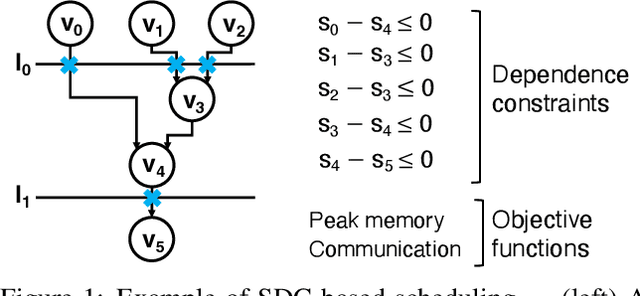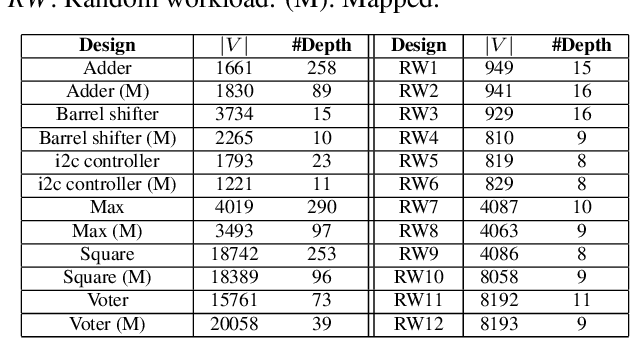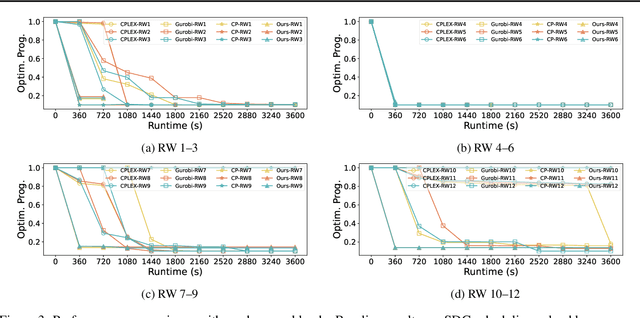Jiaqi Yin
PAIR-Former: Budgeted Relational MIL for miRNA Target Prediction
Jan 31, 2026Abstract:Functional miRNA--mRNA targeting is a large-bag prediction problem: each transcript yields a heavy-tailed pool of candidate target sites (CTSs), yet only a pair-level label is observed. We formalize this regime as \emph{Budgeted Relational Multi-Instance Learning (BR-MIL)}, where at most $K$ instances per bag may receive expensive encoding and relational processing under a hard compute budget. We propose \textbf{PAIR-Former} (Pool-Aware Instance-Relational Transformer), a BR-MIL pipeline that performs a cheap full-pool scan, selects up to $K$ diverse CTSs on CPU, and applies a permutation-invariant Set Transformer aggregator on the selected tokens. On miRAW, PAIR-Former outperforms strong pooling baselines at a practical operating budget ($K^\star{=}64$) while providing a controllable accuracy--compute trade-off as $K$ varies. We further provide theory linking budgeted selection to (i) approximation error decreasing with $K$ and (ii) generalization terms governed by $K$ in the expensive relational component.
Schema Lineage Extraction at Scale: Multilingual Pipelines, Composite Evaluation, and Language-Model Benchmarks
Aug 10, 2025Abstract:Enterprise data pipelines, characterized by complex transformations across multiple programming languages, often cause a semantic disconnect between original metadata and downstream data. This "semantic drift" compromises data reproducibility and governance, and impairs the utility of services like retrieval-augmented generation (RAG) and text-to-SQL systems. To address this, a novel framework is proposed for the automated extraction of fine-grained schema lineage from multilingual enterprise pipeline scripts. This method identifies four key components: source schemas, source tables, transformation logic, and aggregation operations, creating a standardized representation of data transformations. For the rigorous evaluation of lineage quality, this paper introduces the Schema Lineage Composite Evaluation (SLiCE), a metric that assesses both structural correctness and semantic fidelity. A new benchmark is also presented, comprising 1,700 manually annotated lineages from real-world industrial scripts. Experiments were conducted with 12 language models, from 1.3B to 32B small language models (SLMs) to large language models (LLMs) like GPT-4o and GPT-4.1. The results demonstrate that the performance of schema lineage extraction scales with model size and the sophistication of prompting techniques. Specially, a 32B open-source model, using a single reasoning trace, can achieve performance comparable to the GPT series under standard prompting. This finding suggests a scalable and economical approach for deploying schema-aware agents in practical applications.
SPARK Hand: Scooping-Pinching Adaptive Robotic Hand with Kempe Mechanism for Vertical Passive Grasp in Environmental Constraints
Apr 29, 2025Abstract:This paper presents the SPARK finger, an innovative passive adaptive robotic finger capable of executing both parallel pinching and scooping grasps. The SPARK finger incorporates a multi-link mechanism with Kempe linkages to achieve a vertical linear fingertip trajectory. Furthermore, a parallelogram linkage ensures the fingertip maintains a fixed orientation relative to the base, facilitating precise and stable manipulation. By integrating these mechanisms with elastic elements, the design enables effective interaction with surfaces, such as tabletops, to handle challenging objects. The finger employs a passive switching mechanism that facilitates seamless transitions between pinching and scooping modes, adapting automatically to various object shapes and environmental constraints without additional actuators. To demonstrate its versatility, the SPARK Hand, equipped with two SPARK fingers, has been developed. This system exhibits enhanced grasping performance and stability for objects of diverse sizes and shapes, particularly thin and flat objects that are traditionally challenging for conventional grippers. Experimental results validate the effectiveness of the SPARK design, highlighting its potential for robotic manipulation in constrained and dynamic environments.
Differentiable Combinatorial Scheduling at Scale
Jun 06, 2024



Abstract:This paper addresses the complex issue of resource-constrained scheduling, an NP-hard problem that spans critical areas including chip design and high-performance computing. Traditional scheduling methods often stumble over scalability and applicability challenges. We propose a novel approach using a differentiable combinatorial scheduling framework, utilizing Gumbel-Softmax differentiable sampling technique. This new technical allows for a fully differentiable formulation of linear programming (LP) based scheduling, extending its application to a broader range of LP formulations. To encode inequality constraints for scheduling tasks, we introduce \textit{constrained Gumbel Trick}, which adeptly encodes arbitrary inequality constraints. Consequently, our method facilitates an efficient and scalable scheduling via gradient descent without the need for training data. Comparative evaluations on both synthetic and real-world benchmarks highlight our capability to significantly improve the optimization efficiency of scheduling, surpassing state-of-the-art solutions offered by commercial and open-source solvers such as CPLEX, Gurobi, and CP-SAT in the majority of the designs.
Accelerating Exact Combinatorial Optimization via RL-based Initialization -- A Case Study in Scheduling
Aug 19, 2023



Abstract:Scheduling on dataflow graphs (also known as computation graphs) is an NP-hard problem. The traditional exact methods are limited by runtime complexity, while reinforcement learning (RL) and heuristic-based approaches struggle with determinism and solution quality. This research aims to develop an innovative approach that employs machine learning (ML) for addressing combinatorial optimization problems, using scheduling as a case study. The goal is to provide guarantees in optimality and determinism while maintaining the runtime cost of heuristic methods. Specifically, we introduce a novel two-phase RL-to-ILP scheduling framework, which includes three steps: 1) RL solver acts as coarse-grain scheduler, 2) solution relaxation and 3) exact solving via ILP. Our framework demonstrates the same scheduling performance compared with using exact scheduling methods while achieving up to 128 $\times$ speed improvements. This was conducted on actual EdgeTPU platforms, utilizing ImageNet DNN computation graphs as input. Additionally, the framework offers improved on-chip inference runtime and acceleration compared to the commercially available EdgeTPU compiler.
RESPECT: Reinforcement Learning based Edge Scheduling on Pipelined Coral Edge TPUs
Apr 10, 2023



Abstract:Deep neural networks (DNNs) have substantial computational and memory requirements, and the compilation of its computational graphs has a great impact on the performance of resource-constrained (e.g., computation, I/O, and memory-bound) edge computing systems. While efficient execution of their computational graph requires an effective scheduling algorithm, generating the optimal scheduling solution is a challenging NP-hard problem. Furthermore, the complexity of scheduling DNN computational graphs will further increase on pipelined multi-core systems considering memory communication cost, as well as the increasing size of DNNs. Using the synthetic graph for the training dataset, this work presents a reinforcement learning (RL) based scheduling framework RESPECT, which learns the behaviors of optimal optimization algorithms and generates near-optimal scheduling results with short solving runtime overhead. Our framework has demonstrated up to $\sim2.5\times$ real-world on-chip inference runtime speedups over the commercial compiler with ten popular ImageNet models deployed on the physical Coral Edge TPUs system. Moreover, compared to the exact optimization methods, the proposed RL scheduling improves the scheduling optimization runtime by up to 683$\times$ speedups compared to the commercial compiler and matches the exact optimal solutions with up to 930$\times$ speedups. Finally, we perform a comprehensive generalizability test, which demonstrates RESPECT successfully imitates optimal solving behaviors from small synthetic graphs to large real-world DNNs computational graphs.
Hateful Memes Challenge: An Enhanced Multimodal Framework
Dec 20, 2021



Abstract:Hateful Meme Challenge proposed by Facebook AI has attracted contestants around the world. The challenge focuses on detecting hateful speech in multimodal memes. Various state-of-the-art deep learning models have been applied to this problem and the performance on challenge's leaderboard has also been constantly improved. In this paper, we enhance the hateful detection framework, including utilizing Detectron for feature extraction, exploring different setups of VisualBERT and UNITER models with different loss functions, researching the association between the hateful memes and the sensitive text features, and finally building ensemble method to boost model performance. The AUROC of our fine-tuned VisualBERT, UNITER, and ensemble method achieves 0.765, 0.790, and 0.803 on the challenge's test set, respectively, which beats the baseline models. Our code is available at https://github.com/yatingtian/hateful-meme
 Add to Chrome
Add to Chrome Add to Firefox
Add to Firefox Add to Edge
Add to Edge